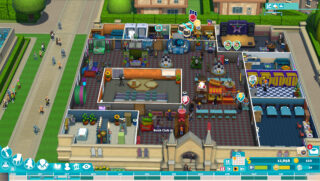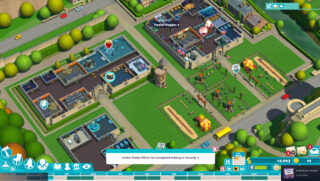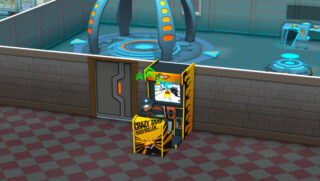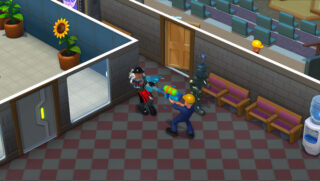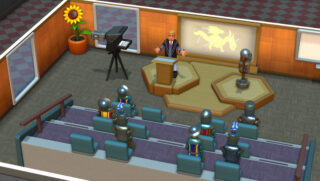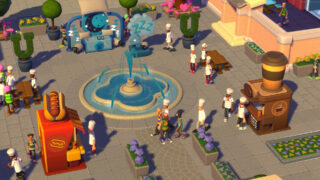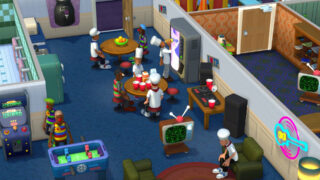Review: Two Point Campus is an education in how to do sim games
Two Point Studio’s second title makes the grade with innovation and humour
- Director
- Mark Webley
- Key Credits
- Gary Carr (Director), Ben Huskins (Design director)

“Sequels are derivative and lazy, and simply rehashing what’s already worked before is an insult to the creative process.”
These aren’t our words, we should stress, but the words of Sir Nigel Bickleworth, one of the fictional hospital radio DJs from Two Point Hospital, who returns as a university radio host in Two Point Campus.
Unwittingly driving a bulldozer through the fourth wall, Sir Nigel spends his time in between songs explaining to listeners why sequels are never a good idea, ending with the obvious caveat that the only exception would be a sequel that includes him.
It’s a joke that not only hits well during the game, but one that shows the confidence of Two Point Studios in its ability to deliver on a successor to the critically acclaimed Hospital, in that it can openly joke about itself without fear of it being turned around and used as legitimate criticism.
It turns out that confidence isn’t misplaced, because Two Point Campus delivers a second helping of comedy-laced simulation gameplay, even if the new industry it deals with does strange things to the game’s difficulty curve.
As you may expect, the aim in Two Point Campus is to build a thriving university and ensure it remains profitable. As in Two Point Hospital, there’s a sandbox mode where it’s possible to just mess around, but the main meat of the game is in its campaign where players take on a series of universities and try to achieve set goals to ensure success.
Despite the change in sector from health to education, Two Point Campus is still similar enough at its core that Hospital players will be able to bring over their previous learnings to a degree. Swap doctors for teachers, patients for students and wards for dorms and you’ve got the same basic framework there.
It’s still about hiring janitors to clean up rubbish and fix things, it’s still about hiring assistants to work at reception desks and stalls. And above everything else, it’s still about making sure students and staff are happy. The more content everyone is, the higher the average grades are, and the more new students you’re likely to attract.
“Swap doctors for teachers, patients for students and wards for dorms and you’ve got the same basic framework there.”
Of course, the sense of humour is something else that’s been carried over. While Hospital had a bunch of comedy diseases, this time it’s comedy degree courses that the students can take, and as each new stage is reached a number of new themed courses are added to the player’s repertoire.
Whether it’s learning to be a knight, a clown, a Virtual Reality expert or a robot designer, each course requires certain types of classroom and qualified staff to be present, and as in any real-life university, these rooms are often used for multiple types of course during a term.
This means that, as the university grows and offers increasingly more courses, there may be a need to have multiple instances of the same room to avoid timetable clashes: a few lecture theatres, for example, or a couple of libraries.
Thankfully, the ‘copy room’ and ‘room templates’ features that were added to Two Point Hospital in later updates are available here on day one, making it easy to create facsimile rooms and save rooms you like so you don’t have to completely rebuild them when you move to the next stage and are faced with another empty university campus building.
Some newer features aren’t quite as useful, most notably the student relationship system. Naturally, the main difference between a hospital and a university is that patients (ideally) leave after only a brief visit, whereas students are potentially going to be there for years.
As such, the game tracks things like their relationships with other students, and some of them can even build romances. The problem is that while it’s certainly possible to pick one student and keep an eye on them to see how their life goes over the course of their academic life, there’s generally so much going on that you’ll likely just ignore the feature entirely. It’s a welcome idea but it’s impractical in practice.
That’s a design choice, but we also encountered a few bugs during gameplay that we hope are addressed soon. When you place radiators the game switches to a visualisation that shows how warm each area is, but sometimes when you place one in a room this doesn’t immediately update.
At one point, when we were extremely low on cash, we were told we needed to hire one Funny Business teacher for an upcoming course. After spending the last of our money to do so, it didn’t appear to count, and we were still told one was needed, meaning we had to take out a loan to hire a second one.
We experienced a few odd quirks like this throughout – the wrong objectives listed to unlock new universities, glitches on the pavement outside the campus grounds, things like that – but we’re loath to mark the game down for things like this which should hopefully be an easy fix once identified.
One thing we’re less keen on is the way each level’s difficulty curve appears to be upside down. This is more a result of the way universities work, but it’s odd nonetheless.
“Each level’s difficulty curve appears to be upside down. This is more a result of the way universities work, but it’s odd nonetheless.”
By and large, when you start a new stage, the first year is difficult. All the rooms have to be built, the entire building’s staff has to be hired, and there’s often only a single course running, meaning there isn’t a lot of money coming in.
Other than the occasional special event like a VIP coming to inspect the school, or an invasion of rival students being repelled by your janitorial staff, there aren’t many opportunities to make money in these early stages, meaning much of the first year is spent sitting there, waiting for the year to end while the bank balance doesn’t do much.
When year two arrives, those first-year students obviously stick around for their second year, and a second course can be added (or the existing one can be expanded to allow bigger classes). Suddenly there are more tuition fees coming in, and more rent being paid by students staying in the dorms.
As each year passes, then, the game actually gets easier. Sure, more staff have to be hired and more land has to be bought to accommodate the new facilities required by the increase in students, but the money eventually rolls in at a healthy enough rate that income is usually higher than expenditure.
Of course, as players progress through the game, each new university is increasingly harder to build from scratch until it reaches that stage of rude health, and it’s here where the challenge lies. But it does create an odd difficulty wave that looks more like a Two Point Hospital patient’s cardiograph reading.
Ultimately, it speaks volumes of what Two Point Campus executes well that these issues – be that the bugs, the erratic difficulty curve or the underutilised relationship system – simply aren’t enough to ruin what is an otherwise hugely entertaining game.
We still laughed out loud at some of the animations, had plenty of hefty chuckles at some of the item descriptions and the not-so-subtle references (you can put a Crazy Taxi machine in the student union), and generally fell in love with the game’s constantly, charmingly silly nature.
And of all the things it carries over from Two Point Hospital, it’s this endearing sense of humour that’s the most important.
Two Point Campus takes its predecessor's lighthearted premise and expertly transfers it to a different environment. Its difficulty curve can be erratic andit has some bugs, but it's a laugh-filled time nonetheless.
- Exceptionally funny writing throughout
- Building and copying rooms is a cinch
- Adapts the Two Point formula in an interesting new way
- Difficulty is all over the place
- New character relationship system is lost in the hubbub

